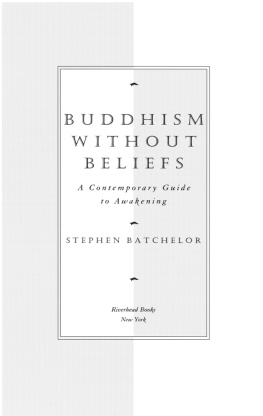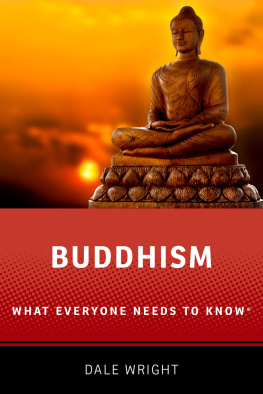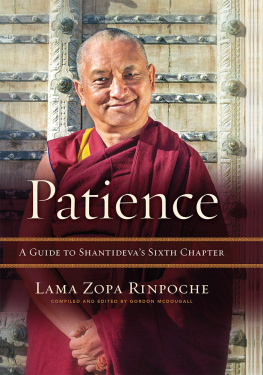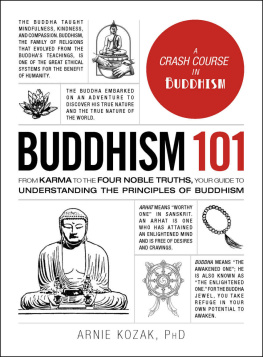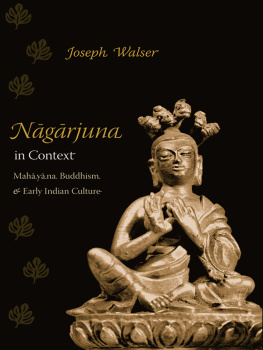Alone With Others
ALSO BY STEPHEN BATCHELOR
A Guide to the Bodhisattvas Way of Life,
A Translation from the Tibetan
of Shantidevas Bodhicaryvatra
Alone With Others
AN EXISTENTIAL APPROACH TO BUDDHISM
STEPHEN BATCHELOR
FOREWORD BY JOHN BLOFELD

Copyright 1983 by Stephen Batchelor
Introduction copyright 1983 by John Blofeld
All rights reserved. No part of this book may be reproduced in any form or by any electronic or mechanical means, including information storage and retrieval systems, without permission in writing from the publisher, except by a reviewer, who may quote brief passages in a review. Scanning, uploading, and electronic distribution of this book or the facilitation of such without the permission of the publisher is prohibited. Please purchase only authorized electronic editions, and do not participate in or encourage electronic piracy of copyrighted materials. Your support of the authors rights is appreciated. Any member of educational institutions wishing to photocopy part or all of the work for classroom use, or anthology, should send inquiries to Grove/Atlantic, Inc., 841 Broadway, New York, NY 10003 or permissions@groveatlantic.com.
Published simultaneously in Canada
Printed in the United States of America
Library of Congress Cataloging-in-Publication Data
Batchelor, Stephen.
Alone with others.
(Grove Press Eastern philosophy and literature series) Bibliography:
I. BuddhismDoctrines. I. Title. II. Series. BQ4150.B37 1983 294.342 82-21054
eBook ISBN-13: 978-0-8021-9648-4
Grove Press
an imprint of Grove/Atlantic, Inc.
841 Broadway
New York, NY 10003
Distributed by Publishers Group West
www.groveatlantic.com
To my mother
ACKNOWLEDGMENTS
I would like to thank the following people who have contributed in various ways to the completion of this work:
H. H. The XIV Dalai Lama; Gesh Rabten; Gesh Ngawang Dargyey; the students of Tharpa Choeling, Center for Tibetan Studies, Switzerland; Anila Anne Ansermett; Frau Dora Kalff; Dr. Martin Kalff; Herr Richard Gassner; the Tibetisches Zentrum, Hamburg; Professor Herbert V. Guenther; Dr. Michael Levin; John Blofeld; and Hannelore Rosset.
CONTENTS
FOREWORD
When first requested to write this Foreword, I felt truly honored on account of my deep respect for the authors scholarship. Nevertheless, my initial instinct was to decline the honor rather than spend much time on a book which, as I then supposed, must by its very nature cause my reactions to be largely negative. Still, I was compelled by a sense of courtesy to give it at least a cursory glance. To my surprise, that cursory glance led to my reading every paragraph with careful attention and to my being unable to put it down until I had devoured the whole rich banquet at a sitting. Meanwhile, my dinner lay congealing in the dishes, so impossible was it to interrupt a task at once so pleasant, so exciting and, in a way, so portentous!
My initial reluctance stemmed from a personal reaction to a good many books in the category of contemporary formulation of traditional Buddhist doctrines. Of course there are many, and by no means all of them have come my way; but most of those I have read (or at least skipped through) have shocked mealmost to the point of un-Buddhist anger! Many of them reduce the Buddha Dharma to what Stephen Batchelor very rightly terms nebulous eclecticism. A smaller number, including the works of certain erudite Buddhist scholars, employ the grotesque jargonbarely comprehensible to most peoplerecently evolved to express fresh concepts relating to the new sciences that purport to further our knowledge of the workings of the human mind. Worse still, those otherwise admirable scholars use these gobbledygook terms to convey the meaning of ancient Sanskrit, Tibetan, and Chinese phrases and concepts. (Is it not impermissible to equate traditional concepts poetically expressed with newly coined terms which, besides being uncouth rather than mellifluous like the originals, have been coined specifically to convey concepts not accessible to ancient writers?) Another consideration that has hitherto made me wary of attempts to present Buddhism in contemporary guise is that reformists, however good their intentions, so often let out the baby with the bathwater and thus throw away what is valuable along with the trashy accretions surrounding it.
Well, despite my misgivings, I called to mind that Stephen Batchelor is a remarkable and rather rare kind of person. He has studied Buddhism the hard way, struggling with difficult Tibetan texts, and listening hour after hour, day after day, to oral expositions by learned Tibetans which, though intrinsically precious and illuminating, are often delivered in a manner that requires patience and determination on the part of their pupils. Furthermore, he has the gift of being able to render difficult Eastern concepts into pellucid English, and has a training that enables him to observe the strict requirements of good scholarship. In particular, his translations of Shantidevas Bodhisattvacaryavatara (A Guide to the Bodhisattvas Way of Life) had left an indelible mark on my mind as one of the most important works in the entire range of English translations of Buddhist texts.
All this should have been enough to dispel my doubts, but I was at the time dubious about the purpose of this new work from an admittedly illustrious pen, namely to describe the development of certain central Buddhist concepts with the help of terminology and methodology devised by exponents of existentialist religion (mainly Christian) and philosophy. The works of Heidegger, Tillich, MacQuarrie, and their confrres do not abound in Bangkoks concrete jungles. Being ignorant of them, I feared more gobbledygook. I was apprehensive, too, that such a book would prove to be yet another example of the pitfalls besetting those who, desiring to promote mutual understanding among the followers of diverse religions, inadvertently distort the separate traditions by pressing them into mutual conformity and thus give an impression of there being more common ground among them than in fact exists. Happily, these fears were soon swept away by study of the typescript: no gobbledygook, no distortion of Buddhist doctrines, but a restatement of them in terms likely to appeal to readers hitherto disinclined to study Buddhism because of its foreign appearance and its seeming remoteness from their own lives.
Having spent almost all my adult life in Asia, I have tried in my own books to convey the very feel of Taoism and of Chinese and Tibetan Buddhism when encountered in their native habitat. I like to think this approach has a certain charm for readers attracted by the mellow beauty of Chinese culture and/or the more dramatic colorfulness of Tibetan culture, as well as by the wisdom enshrined in both. However, such an approach has three important limitations. First, it may be ignored by readers quite uninterested in Eastern cultures per se, but who would nevertheless be attracted to Buddhism if they were led to discover in it universal verities of pressing concern to them personally. Second, it does too little in the way of assisting people engaged in the transplantation of Buddhism to various parts of the world where it cannot, if its outer aspects remain highy exotic, survive for long in societies more interested in revitalizing their own way of life than in adopting foreign ways. Third, though I tend strongly in the direction of traditionalism, I do realize how impossible it is to accept
Next page




